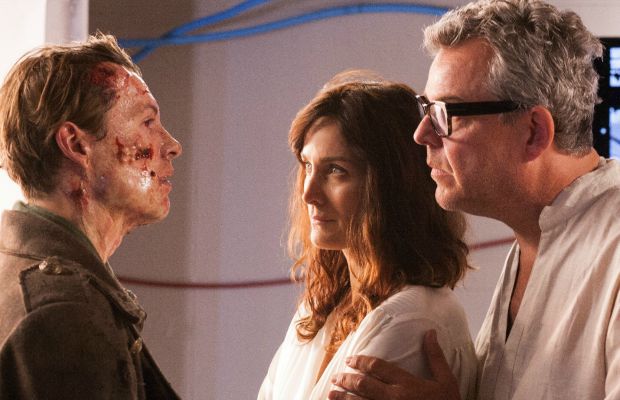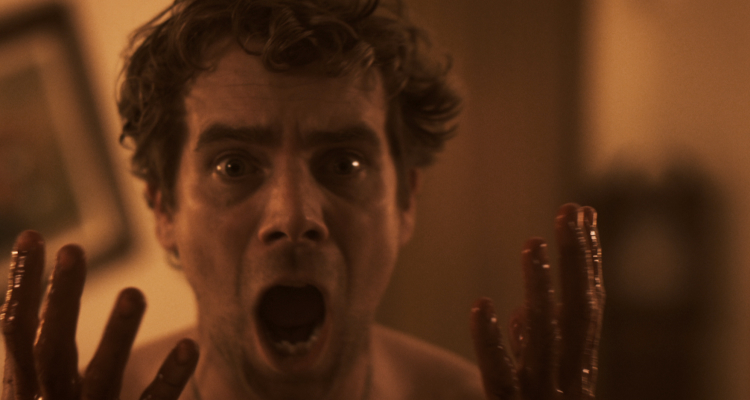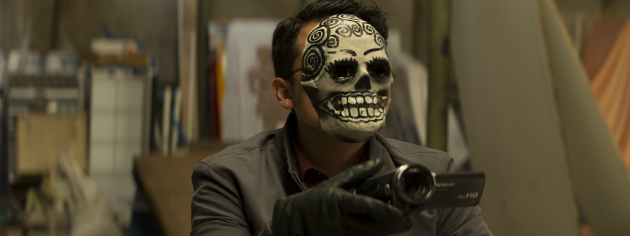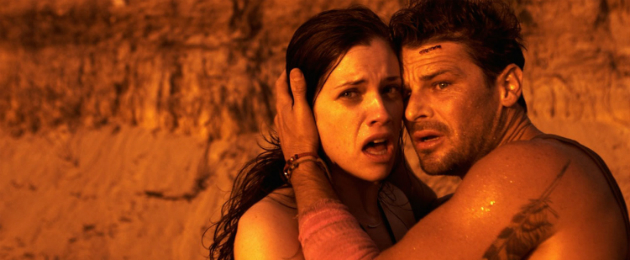FrightFest 2015 Dispatch: FRANKENSTEIN, ROAD GAMES, SCHERZO DIABOLICO, And More







Frankenstein
Retelling Mary Shelley's gothic novel - rather than James Whale's iconographic and influential spin on it for Universal in 1931 - Bernard Rose's Frankenstein is a story of hubris, abandonment and marginalisation in contemporary LA, told from the point of view of the ultimate empowered underdog. Born with a child's developing mind in a superstrong adult body, the Monster (Xavier Samuel) barely has time to imprint on his nurturing mother (Carrie-Anne Moss) before his scientist father (Danny Huston), unhappy with the creation's degrading, imperfect flesh, sends his 3D-printed miracle to be scrapped. Yet the Monster dies hard, and fleeing confused and terrified into the world beyond the laboratory, finds his innocent nature being gradually cast into the cruel, uncaring image of all around him, so that he eventually - just as he has learnt to do - harms the ones he loves.
Frankenstein may come with its share of bloody, bludgeoning brutality, but it also shows how such violence is acquired behaviour, as the Monster, in search of meaning and mother, becomes a living petri dish for the conflict of nature and nurture - and as a result, every blow here is fully felt, and never feels gratuitous or out of place. For while Shelley's myth may now be forever associated with horror, Rose's focus is more on the story's tragic elements, while his updating accommodates all kinds of commentary on the gulf between the beautiful, privileged people of Hollywood and the alienated, overlooked underclass just down the road. This latter community is embodied by Rose regular Tony Todd (Candyman), characteristically engaging as the blind mendicant bluesman Eddie who alone tries to school the Monster in the basics of humanity. The results are a haunting - and touching - film that exposes the monstrousness in us all.
Another Me
Faced with the approaching death of her MS-afflicted father (Rhys Ifans) and the adultery of her mother (Claire Forlani), aware for the first time of the unusual circumstances surrounding her own birth, and drifting into her first sexual relationship with schoolfriend Drew (Gregg Sulkin), teenager Fay (Game of Thrones' Sophie Turner) is on all sorts of cusps. As Fay rehearses in the role of Lady Macbeth for the school play, and gets a radically different haircut and look, she is also tentatively trying on the different guises of adulthood while struggling to maintain a semblance of continuity for her changing identity. This sense of rupture and loss in Fay's adolescent experience is given tangible (if blurry, edge-of-the-screen) form in an alter ego that the young woman is convinced is stalking her and trying to take her place - not unlike her jealous understudy Monica (Charlotte Vega).
Another Me also shows us another side of Spanish director Isabel Coixet (My Life Without Me, Elegy, Map of the Sounds of Tokyo, Yesterday Never Ends), here making her first forays into both the murky borderlands of genre and the menacing underpasses of Cardiff, Wales. Adapted by Coixet from the 2003 novel of the same name by Cathy MacPhail, the film plays out all the expected tropes of a doppelgänger film in a dreamy haze, while leaving it for the viewer to decide whether this divided self is a real spectre dogging Fay, or a mere metaphor for her anxieties about coming of age. Fay may be haunted and even self-harming, but Coixet suggests - with a certain ambiguity - that as we grow up our scars can heal.
Inner Demon
Sam (newcomer Sarah Jeavons) reassures her much younger sister Maddie that if there really were, as Maddie believes, malevolent creatures hiding under the bed (in shades of The Babadook), "I'd kill them with my own hands." "What happens if they kill you first?", Maddie asks. "I'd find a way."
This exchange, near the beginning of Ursula Dabrowsky's Inner Demon, foreshadows the way the film will divide itself between vicious home invaders and vengeful revenants. If Sam spends much of the film's second half hidden in a closet, bearing witness to unfolding horrors while trying to undo the hinges with a penknife, the film itself pivots on two different subgenres, while getting trapped in an overlong and repetitive middle section of hide and seek.
After being abducted by husband-and-wife serial killers Karl (Andreas Sobik) and Denise (Kerry Ann Reid), the resourceful but injured Sam manages to escape, only to seek shelter in the bushland home where in fact the couple lives. Dabrowsky focuses tightly on Sam's often very limited perspective, so that much of the more visceral horror in this Australian spin on The Texas Chain Saw Massacre is kept out of shot and left to the imagination. Yet when Sam is not endlessly running among the trees, she is confined to the cupboard, in scenes that feel stretched with padding to bring the film to feature length. Karl's use of the narrative frame of Hansel and Gretel to characterise the situation in the house (with Sam cast, perversely, as the witch) deepens this material somewhat, while anticipating the supernatural ending - but this would have worked much better as a short. Sam does, though, make for an unusual final girl, in that ultimately her survival is figured less as a triumph than as a failure. Finding a way to overcome death turns out, after all, not to be a straightforwardly happy ending.
Road Games (world première)
After a prologue shows a human corpse removed from a car boot to be sawn into pieces and buried in the woods, English tourist Jack (Andrew Simpson) appears trying - and failing - to hitch a ride home from the South of France, his fingernails bloodied and his arm bandaged. Jack rescues local orphan free spirit Véronique (Joséphine de la Baume) from a violent altercation with a male driver, and the two decide to hitchhike together for 'safety in numbers', not least because a murderer is at large, described by Véronique as "a serious [sic] killer like, um, Jack the Ripper".
Yet they end up staying the night in the palatial home of Bruno Grizard (Frédéric Pierrot) and his anxious American wife Mary (Barbara Crampton), where nerves are fraying, relations are tense and something is definitely going unsaid. "I've seen a few dumb animals but this one's definitely top of the list," says Grizard of the rabbit that he has just run over and now wants to cook for dinner, adding "Mistakes happen."
Indeed, Abner Pastoll's Road Games (Fausse Route) is not just an Anglo-French co-production, but its tensions and ambiguities are facilitated by cultural and linguistic misunderstandings - and we are left to wonder whether Jack is the Ripper, or just more rabbit roadkill caught in the headlights and destined for the domestic pot. Even if you manage to disentangle the many twists relatively early on, there is still pleasure to be had here in witnessing how Pastoll's bilingual screenplay allows crucial giveaways to get lost in translation. And for a film where nuances in the characters' looks and gestures often tell a different story from their mere words, the performances here are uniformly excellent.
Farhope Tower
"Go up."
These are the words which the 'Unspecters', a team of five paranormal investigators, find graffitied all over a basement room of the long abandoned Farhope Building. After they have ascended a staircase mysteriously not on the building's blueprints, and found that the edifice's internal architecture keeps shifting in defiance of all physical law or logic, they hear disembodied voices whispering the same two words. Although the building has over the years accommodated a disproportionately high number of suicides on its upper floors, the Unspecters have agreed to break in one evening in the (far) hope that the dangers of its haunted halls will help them win paid syndication with webcasters RealVibe.
Yet what goes up must come down, and while April Mullen's Farhope Tower builds and builds to the eventual arrival of team leader Jake (John White) and his pregnant girlfriend Zoe (Mullen) to the edifice's penthouse, where 38-year-old history seems destined to repeat itself, by the time they get there the film has completely run out of ideas, culminating in one of the most disappointingly bathetic endings on offer this entire FrightFest weekend. It does not help that much dialogue at the film's beginning is devoted to how the 'Unspecters' wish to "separate…from the pack" of their rival ghost hunters and take their chosen genre to "the next level", when in fact all Farhope Tower has to offer is noises off and preternatural possessions of a markedly conventional variety.
Scherzo Diabolico
"You need a strong grip," Aram (Francisco Barreiro, all restraint behind his big moustache) is told by gangster client Mendez, whom he has just saved from going to prison. Aram works hard, while his often absent boss Granovsky reaps all the benefits. "Always late, and never getting a raise," as Aram's dismissive, distant wife says of the meticulous accountant. Yet Aram has a plan. A plan that involves seeking advice on choking from Mendez and the internet, practising strangleholds on his own Alzheimer's-afflicted father, learning the most effective methods of hog-tying from a prostitute he regularly visits, and stalking a teenaged girl as she walks home from school every day. Once Aram has ruthlessly executed this plan, his life will take several steps up - but the CD of 'All-Time Piano Classics' that he had played to calm himself and to calibrate his actions may also orchestrate the unravelling of everything that he has built.
Adrían García Bogliano's Scherzo Diabolico may be bookended with Charles-Valentin Alkan's piano étude of the same devilish name, but it is Mozart's Rondo Alla Turca, played recurrently in the film, that will come (like Beethoven's Ninth Symphony in A Clockwork Orange) to dominate, modulate and ironise everything, its jauntiness introducing a note of dark Coen-esque comedy, and its ring compositional form reflecting the table-turning symmetries to come.
Occasionally putting juddery drone-mounted cameras to stylised use to keep viewers at a God-like remove from all the unfolding moral horror, Bogliano, like Aram, manages the film's events with a rigorously methodical control that shoves violence and depravity away into the distance or the dark - but the repressed will eventually reemerge with a bloody, bludgeoning vengeance.
As a thriller Scherzo Diabolico is well-tempered and taut, parcelling out its narrative information in much the same way that Aram compartmentalises the different aspects of his life. Yet it is as an Oedipal drama, where the tragic trajectory of one person's rise comes only with the destruction of the boss/father, that Bogliano's film finds its strongest (and subtlest) sociopolitical grip. This may be a dog-eat-dog world, but in Bogliano's bleakly passive-aggressive vision, once the questionable justice starts being meted out by proxy, the collateral damage spreads like a plague of mice. The results are finely-tuned perfection.
These Final Hours
If one thing is certain in life, it is that none of us will survive it. With the end already written into every breath we take, who we are is defined by what we do with our brief time here. Such ethical and eschatological concerns are presented in intensified form by Zak Hilditch's These Final Hours, which follows a feckless, somewhat conflicted individual as he must decide how to spend his last day on Earth. As the full, fiery impact of a comet that has just crashed into the North Atlantic is due to hit Perth in 12 hours, James (Nathan Phillips) loves and leaves Zoe (Jessica De Gouw) for a hellishly hedonistic end-of-the-world party across town with his girlfriend Vicky (Kathryn Beck) - but from the chaotic breakdown of civilisation that James encounters along the way, young Rose (Angourie Rice) appears in need of his help and shifts his moral priorities towards an eleventh-hour personal redemption that is heroic in spite, perhaps even because, of its utter meaninglessness.
Whether in On the Beach (1959) or One Night Stand (1984), cinema has often envisaged Australia as the last outpost against coming apocalyptic devastation. These Final Hours is a morality drama that depicts different shades of humanity in extremis, although, unlike its closest analogue, Don McKellar's Last Night (1998), it prefers to focus on the experiences of an individual rather than an ensemble, and so risks making all its other characters seem like mere foils and bit players to James' own solipsistic struggles with himself. Still, its glimpses of Aussie suburbia in desperate, existential collapse are hauntingly surreal, and in the end it lives up to Zoe's words: "It's not too late to change your mind. It'll be a great view from here."

More about Road Games
More about Scherzo Diabolico
- Now On DVD/VOD: SCHERZO DIABOLICO, Deviously Disturbing Horror Thrills
- BLACK CIRCLE: Adrian Garcia Bogliano Takes His Horror To Sweden With Christina Lindberg
- Interview: Adrián García Bogliano Talks SCHERZO DIABOLICO
- First SCHERZO DIABOLICO Trailer: The Accountant Strikes Back
- Short Film, Short Review: If You Listen Closely You Can Still Hear Their VOICES
Around the Internet
Recent Posts
Friday One Sheet: LIVING THE LAND
Now Playing: BLADES OF THE GUARDIANS and Some Other Movies
Leading Voices in Global Cinema
- Peter Martin, Dallas, Texas
- Managing Editor
- Andrew Mack, Toronto, Canada
- Editor, News
- Ard Vijn, Rotterdam, The Netherlands
- Editor, Europe
- Benjamin Umstead, Los Angeles, California
- Editor, U.S.
- J Hurtado, Dallas, Texas
- Editor, U.S.
- James Marsh, Hong Kong, China
- Editor, Asia
- Michele "Izzy" Galgana, New England
- Editor, U.S.
- Ryland Aldrich, Los Angeles, California
- Editor, Festivals
- Shelagh Rowan-Legg
- Editor, Canada













